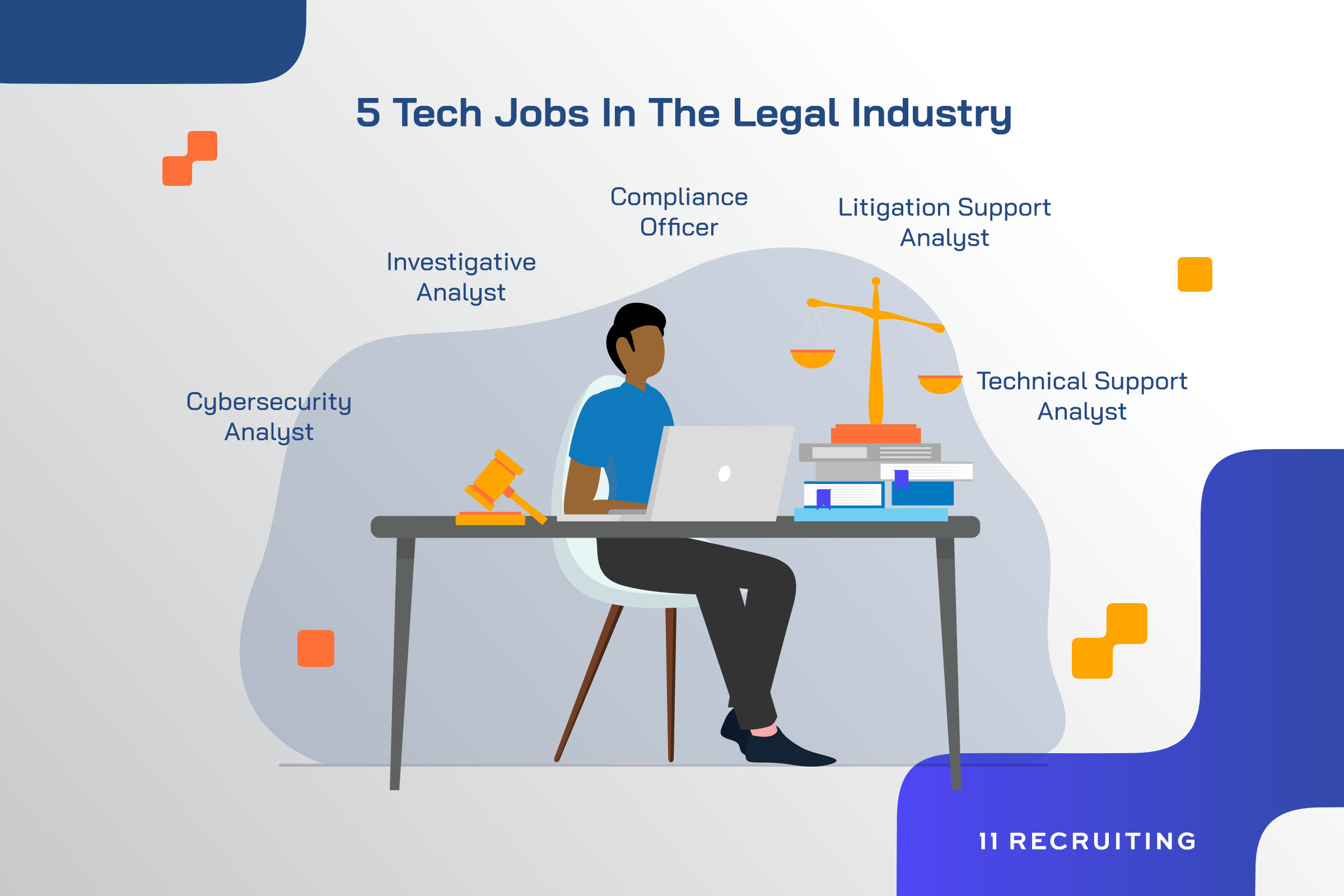
After the pressure from the pandemic, there has been a lot of workload in the legal field, and thus the legal industry is actively considering embracing technology. Legal tech jobs are one of the thriving fields in tech, especially now that the industry embraces extensive automation of certain legal activities around significant corporate transactions and work processes. While tech jobs are
Tech jobs are gaining momentum by blurring outlines between technology and the legal industry, so there will be a huge demand for tech professionals with specific Legal tech skills. This article highlights five tech jobs in the legal service industry with particular tech skills that’ll help you enter any entry-level legal tech job.
Frequently Asked Questions
What are some technical skills for entry-level IT jobs?
Getting high-paying tech jobs depends on your technical skill level and how well you can demonstrate that skill to your employers. Fintech jobs require technical skills such as data management, analytics, and logical thinking. You’llYou’ll also need strong experience in programming languages such as c++, java, c#, SQL, and python to have a competitive advantage over other candidates. Specialized training and courses will get you a shot at the best-paying fintech jobs.
What are some non-technical skills for entry-level IT jobs?
More than technical skills, tech jobs require non-technical skills like communication skills to communicate the aspects of your technology project for best results and adaptability and creativity skills to think outside the generic IT box and develop innovative and valuable consumer technologies. Problem-solving and collaborative skills are also essential to think fast during challenging situations, develop a viable solution, and collaborating with teams to find a standard resolution; internally and with external partners are vital.
What should I look out for in entry-level IT jobs?
When applying for an entry-level IT position in the legal industry, look out for potential career advancement and network opportunities. Be sure there is a clear path for more job responsibilities to help you acquire more skills and build your professional network. A good organizational culture is another essential aspect you should look for, so do an organization shadow to know what the organization values and how best their teamwork is.
Look out for the salary, incentives, and job benefits, and make sure you’re satisfied with what the organization offers. After all, entry-level IT jobs don’t pay as much as professional level, but incentives and other factors like training opportunities can help you enjoy your work at this stage.
How can I get into an entry-level IT job?
Entry-level IT jobs in the legal industry are often accessible for individuals with little background in online legal services, cybersecurity analytics, and other related fields. While some tech jobs in the legal service require little or no professional experience in law, it’s essential to build your skills with the necessary tech and soft skills and get suitable certification courses to boost your chances of getting hired.
If you still find it hard to get tech jobs in the legal industry, consider speaking to a recruitment organization to help position yourself in the hiring market space. And while you do that, adjust your resume and cover letter to include transferable skills that fit tech roles in the legal industry because your resume is one thing that can sell you well to land an interview.
5 Tech Jobs In The Legal Industry

Here are some of the exciting careers that are available in this sector:
Investigative Analyst
Investigative analysts work within the investigative and IT team in the legal industry. As one of the few tech jobs in the industry, it involves searching, gathering, and analyzing comprehensive legal reports and often supporting a lead legal person with well-judged results and assessments. Aside from this, they also perform some necessary follow-up actions to internal and external stakeholders to communicate compliance findings and resolve broken processes.
Skills: Investigative analysts need computer and analytics skills to identify trends, collect relevant data, interpret it, enter it into databases and run models to find possible results for preferred solutions and consultations. Soft skills like solid decision-making, communication, attention to detail, customer service, and the ability to work in a high-pressure environment are fundamental. Prior transferable skills in research, risk management, compliance, and confidentiality will also be vital for success in this role.
Salary: Entry-level investigative analysts make roughly $71,150 to about $74,000 annually in the United States.
Cybersecurity Analyst
Every industry relies on data, especially the legal industry. Still, with the emergence of technology, there have always been attempts of cyber attacks to access networks and contaminate or steal industry information. As one of the most vital tech jobs in the legal industry, a cybersecurity analyst’s role is to assess vulnerability, find and monitor security threats and risks and then continuously find ways to implement protective strategies to keep the company’s information from any form of cyber attacks.
Skills: For an entry-level position as a cybersecurity analyst, many recruiters will ask for programming skills and an understanding of networks, cloud infrastructure, data storage systems, TCP/IP suite, routing protocols, and risk management. Your analytical and communication skills should also be top-notch; your problem-solving skills and skills in managing security audits, threats, and vulnerabilities are also necessary.
Salary: The average entry-level cyber security analyst’s salary ranges from $64,000 to $80,966 annually in the United States and has a $4,000 cash bonus annually.
Compliance Officer
Compliance and risk management are two major areas in the legal industry that have experienced a fast boom, where compliance experts, compliance officers, and compliance analysts come into play. A compliance officer maintains their online legal services’ legal, financial and ethical integrity and ensures that the organization fully complies with all regulations, rules, laws, and policies laid out by the government and the business. While being another vital position amongst tech jobs in the legal industry, their role is critical to ensure that their clients don’t suffer the hefty fines, legal ramifications, and reputation damage resulting from illegal or immoral business practices.
Skills: Some soft skills that can help you land tech jobs as a compliance officer are analysis skills, communication skills, attention to detail, problem-solving, conflict management, and risk assessment abilities. Solid knowledge of compliance management, information and cloud security, and FDA regulations is also essential.
Salary: The average salary for a compliance officer is $64,281 per year in the United States, with additional benefits that include but is not limited to a flexible work schedule, opportunities for career advancement, and professional development assistance.
Litigation Support Analyst
As one of the few entry-level IT jobs in the legal industry, the Litigation Support Analyst assists the efforts of the legal firm with the help of technology. Their primary role is to search, build, maintain, troubleshoot, and organize databases from the day-to-day litigation support needs of assigned cases and projects.
Skills: Some soft skills that can help you land tech jobs as a Litigation support analyst are analysis skills, communication skills, interpersonal skills, family with search and organizational techniques as well as attention to detail. It would be best if you also have proficiency with computer applications, software, and merger acquisitions and the ability to learn new software applications and follow complex regulations for the data management process.
Salary: In the United States, the average entry-level salary for a litigation support analyst ranges from $38,000 – $60,568 per year.
Technical Support Analyst
A technical support analyst in the legal industry helps to test, maintain, install and troubleshoot hardware, software, or networking issues and provides technical help to clients. Other essential qualities for this role are practical communication, customer service, listening, and problem-solving skills. A technical support analyst should be vast with platforms and systems such as Windows and macOS desktops (blended), G Suite, JIRA, Cisco, and MS Office for tech jobs like this in the legal industry.
Salary: Entry-level technical support analysts make roughly $35,000 a year, which is $24.26 per hour in the United States.
To sum up
These tech jobs are a good start if you consider entering the legal industry. While it may require some on-the-job training with relevant courses, it will help you grow professionally and provide career prospects in the long run. Don’tDon’t forget to revamp your resume to fit the job description and prepare for your interview.
You can also consider speaking with an IT recruiter or recruitment team to determine the role you can get with your current level of education, location, and experience and what you can do to increase your chances of getting into tech jobs. Remember to pay attention to your interview and onboarding process; it’ll tell you more about the organization’s workplace culture and DE&I practices.
Want more news about entry-level IT jobs? Catch all this information and go to our candidate services page.

